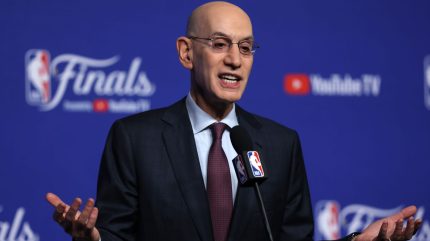
The National Basketball Association (NBA) has long had eyes on global domination. From NBA Africa to global games taking place in London, Israel, Beijing, the Philippines, and Paris, the NBA has long looked outside of North America as a means of growing the footprint of the league.
Europe has been a long-term target, with continental Europe being a hotbed of basketball. In fact, basketball is so popular in Europe that the pipeline of NBA superstars from the region is long established, with arguably some of the best players in the league coming from the likes of Slovenia, Serbia, Greece, and France. The NBA is littered with players from across Europe, with Turkey, Latvia, Finland, Germany, and Italy all currently represented. The next step? A European NBA league.
Basketball in Europe has been organized for some time along the same lines as soccer – teams competing in a domestic league and then moving into a European-wide format, i.e., the EuroLeague, to determine the best team. While there is an established format, the NBA’s partnership with global governing body FIBA to assess the opportunity available suggests that they see possibilities.
NBA commissioner Adam Silver certainly sees the commercial benefits, saying: “While Europe continues to develop some of the very best players in the world … we think that the commercial opportunity has not kept pace with the growth of the game.”
Meanwhile, George Aivazoglou, the managing director of NBA Europe-Middle East, called Europe the “single biggest opportunity in global sports today.” Reading this as anything other than the desire to commercialize the European game and find the next Luka Doncic would be naïve.
The US podcaster, Bill Simmons, regarded by many to be the authoritative voice on basketball, outlined the plan recently on his ‘Bill Simmons Podcast’. Simmons speculated that with several licences coming up for renewal in Europe (teams competing in EuroLeague are subject to licences, teams having an A, B, or C licence to compete), the NBA would be able to tempt several ‘anchor’ teams into joining an expansion project, highlighting that European basketball superpowers Real Madrid and Barcelona were both teams with expiring licences.

US Tariffs are shifting - will you react or anticipate?
Don’t let policy changes catch you off guard. Stay proactive with real-time data and expert analysis.
By GlobalDataReal Madrid president Florentino Perez once suggested Real Madrid join the NBA’s Eastern Conference, so would no doubt be open to a European expansion.
By putting those teams into an eight-league expansion along with the likes of AC Milan, Paris Saint Germain, a Greek team such as Panathinaikos along with a couple of other franchises attached to leading European soccer clubs – for example Manchester City and a Turkish team or perhaps Bayern Munich – the league could be ready to go for the start of the 2026-27 NBA season, which would coincide with Silver’s thoughts that they would be years away, as opposed to months, when speaking back in June 2025.
The league would require a buy-in – anywhere from $500 million to $1 billion – which would be supported by a firm like JP Morgan, which has shown willingness in the past to ‘guarantee’ a new sporting vehicle in Europe, having backed soccer’s aborted European Super League.
A formalized structure, with no relegation and association to the NBA would likely interest media organizations as well as sponsors, who would pay significant sums to get in on the ground floor of any potential league. Starting with an eight-team league would give the NBA a solid foundation but would still allow the member teams to play in their own domestic leagues.
Longer term, however, it is hard to see how domestic leagues would be able to compete if the NBA was willing to support an expanded league with a similar number of teams as the NBA has in North America.
In what is seemingly a trend for all sports leagues, but a trend that has been maximized by the US sports leagues most effectively, it is no longer enough to grow your game in your own market; you must take your product abroad.
With the European soccer leagues eyeing the North American market, it seems the NBA is keen to take part in a trade to try to capture what they hope is an audience receptive to a change in structure for basketball.
The appetite will be there from clubs and teams who will no doubt see the potential riches and association with the NBA can provide, but whether the likes of the EuroLeague will take the challenge lying down is another matter entirely. For now, the NBA has made its intentions clear. What comes next will likely decide the future of European basketball.





